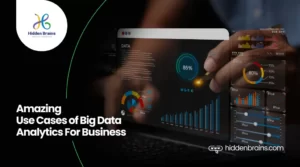The volume of data that we generate and consume every day is growing exponentially. The volume of data is growing and the pace of that growth is accelerating. Key indicators like Sensor data, log files, social media and other sources have emerged, which bring volume, velocity, and variety of data that far outstrips traditional data warehousing approaches.
Organizations with futuristic outlook have already started to harness such new sources in clever ways to achieve unimaginable value and competitive advantage.
This is not as simple as putting all of this data in one place and start accumulating the results. Real business value of these “big data” sources is procured only with the help of specific use cases and applications. The applications can be spread widely throughout a number of different departments and industries.
Harnessing Big Data for broadening the horizons
There definitely are numerous unprecedented technical challenges while integrating and managing all of this data. Organizations have to be vigilant in identifying and crystallizing the right use case or use cases for their own business needs. This is a vital step where organizations can understand the key business insights they want to attain. And also improve on the results that they can achieve with those insights.
Numerous organizations exist today which are still in the infant stages of considering their potential use cases for big data. They are in search of companies who provide mature big data analytics solutions with hands on experience.
Real life use cases of big data that are revolutionizing the way we perceive things
At a greater level, big data analytics solutions address far greater challenges head on. Big data analytics is the answer to unlocking the insights from all your data types, as it enables you to analyze all of your structured, semi-structured and unstructured customer data together.
Big data analytics is powerful since it enables organizations and individuals to combine, integrate and analyze all the data at once – regardless of source, type, size, or format and generate the required insights in order to address a wide range of business challenges.
Here are few big data use cases you must know about.
- Kaggle
When you talk about big data, Kaggle is one of the first companies that come to mind. It almost entirely embody all the principles of big data entrepreneurship under one roof.They have a myriad of working models from crowd-sourcing to predictive modelling, gamification etc. Kaggle has managed to work out how to turn a profit from them. The company is based out of San Francisco. It awards cash prizes to its teams of “citizen scientists” who are in direct competition to untangle big data challenges of all shapes and sizes.And with Kaggle, not only businesses are benefiting by applying the concept of crowd-sourcing to data analytics, but also the ones involved in further scientific and medical research are reaping the fruits. Some of their projects include looking deep into the cosmos for traces of dark matter, and furthering research into HIV treatment. - Microsoft
Today, Microsoft is a key player in almost all segments of computer and information technology. And the dawn of big data era was evident with the rise of personal computers, the graphical operating system and the internet.With its foundation laid strong, Microsoft had a substantial head-start over the competition. The very first forays of the company into the world of big data were sparked way before even the first version of MS-DOS.Bill Gates and Paul Allen’s first business venture, two years before Microsoft, was a system that provides real-time reports for traffic engineers by using data from roadside traffic counters.With time and effort. Microsoft, like competitors Google and Amazon it offers its own “big data in a box” solutions, combining open-source with proprietary software to offer large-scale data analytics operations to businesses of all sizes.
Microsoft’s Analytics Platform System amalgamates with Hadoop with its industry-standard SQL Server database management technology, while its predominant Office 365 will soon make data analytics available to an even wider audience, with the inclusion of PowerBI, that adds basic analytics functions to the world’s most widely used office productivity software.
- General Electric
General Electric is nothing less than a mega ‘powerhouse’ in terms of a corporation that is involved in virtually every area of the industry, including the Industrial Internet of Things (IIoT).Coming of age industry applications will increase the efficiency by enabling every aspect of an industrial operation to be monitored and tweaked for optimal performance, and reduce down-time.GE has Sensors embedded in their power turbines, jet engines and hospital scanners that constantly collect data. A typical gas turbine generates tons of GB of data every day. And in return, if that data can be utilized to boost efficiency even by the slightest margin across other key sectors that they sell to, it can save billions of dollars. A few years back, Abu Dhabi-based Etihad Airways had deployed Taleris, GE and Accenture’s Intelligent Operations technology that generates huge amounts of data which gets recorded from every aircraft and every aspect of ground operations, and is then reported in real-time and targeted specifically to recovering from disruption, and returning to regular schedule.They have also launched a Hadoop based database system that enables its industrial customers to move its data to the cloud. There are machines deployed that are smart enough to order new parts for themselves and minimize expensive downtime.
Conclusion
Big data brings in the power to combine, integrate and analyze all of your data – regardless of source, type, size, or format to quickly and affordably scale to huge volumes of data and analyze them for in-depth insights.
The greater part of the challenge is turning big data into insights. How can companies get the most out of this data and bring together and analyze all of the data at once – be it structured and unstructured – and use it to deliver innovative new data and analytics products and services? The answer lies in the emerging market of big data analytics solutions.































































































![Sales & Distribution [Oil & Gas] Sales & Distribution [Oil & Gas]](https://www.hiddenbrains.com/blog/wp-content/themes/blankslate/assets/images/sales_and_distribution-icon.74d08193.svg)

![Fluid Terminal Management [Oil & Gas] Fluid Terminal Management [Oil & Gas]](https://www.hiddenbrains.com/blog/wp-content/themes/blankslate/assets/images/fluid_terminal_management-icon.4b3a27a4.svg)































![Sales & Distribution [Oil & Gas] Sales & Distribution [Oil & Gas]](https://www.hiddenbrains.com/blog/wp-content/themes/blankslate/assets/images/sales_and_distribution-icon.74d08193.svg?1.0.0)
![Fluid Terminal Management [Oil & Gas] Fluid Terminal Management [Oil & Gas]](https://www.hiddenbrains.com/blog/wp-content/themes/blankslate/assets/images/fluid_terminal_management-icon.4b3a27a4.svg?1.0.0)
























































































































































































